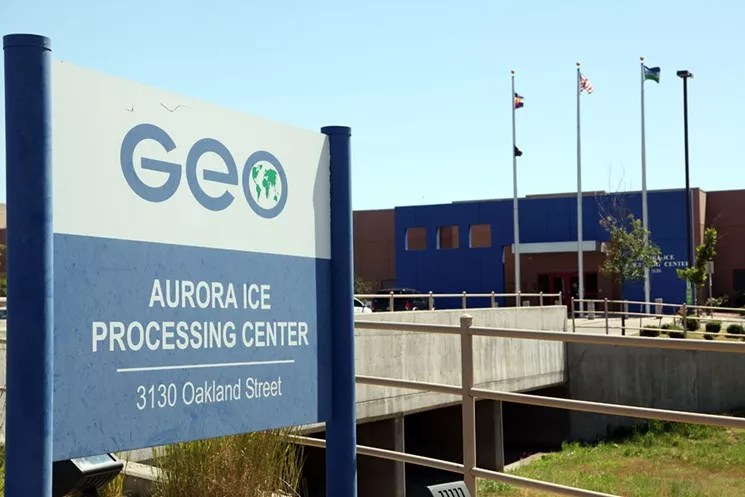
Anthony Camera

Audio By Carbonatix
Melvin Ariel Calero Mendoza, a 39-year-old Nicaraguan asylum seeker, died on October 13 while in the custody of Immigration and Customs Enforcement in Aurora.
“People should not die as they try to seek asylum. There’s a great irony there. If somebody is fleeing their home country of Nicaragua and are fleeing political violence, they shouldn’t come to this country and be put in a position where they end up losing their life anyway,” says Laura Lunn, director of advocacy and litigation at the Rocky Mountain Immigrant Advocacy Network.
Calero Mendoza passed away at the University of Colorado Hospital in Aurora. “An autopsy is pending to determine the official cause of death,” ICE notes in a press release.
“He was 39 years old, so clearly something catastrophic happened. At this point, we can’t really say much more, because we’re not in touch with his family,” Lunn says. “We don’t feel comfortable sharing any of the details of what we’ve been hearing at this point out of respect.”
However, Lunn does reveal that Calero Mendoza essentially dropped dead in front of other ICE detainees at the Aurora Contract Detention Facility, a federal detention center that’s run by the private prison company GEO Group.
“It’s my understanding that they called an ambulance for a reason. That’s very unusual. Most people who have some kind of medical problem struggle to even get taken to medical. For somebody to be in the dorm and then for an ambulance to come, that’s highly unusual,” says Lunn.
The Aurora ICE facility primarily houses ICE detainees, including asylum seekers, undocumented immigrants with and without criminal convictions, and documented immigrants who are potentially subject to deportation because of criminal convictions. The facility also has a population of pre-trial federal inmates.
The U.S. Border Patrol had detained Calero Mendoza and issued a notice on April 13 for him to appear in immigration court, according to the ICE release. On May 2, the federal government transferred Calero Mendoza to ICE custody in Aurora.
An immigration judge with the Executive Office of Immigration Review issued an October 5 decision ordering Calero Mendoza to be deported from the U.S. “There is a 30-day period reserved before action is taken to accommodate any appeals,” ICE says in its release.
But Calero Mendoza may not have been able to pull together much of an appeal; like around 70 percent of ICE detainees at the Aurora detention facility, he was navigating the immigration legal system without an attorney.
“The system is set up for people to fail, and unfortunately, Melvin’s case is emblematic of just that. And not only did he pay in terms of his legal case, but he paid in terms of his life,” Lunn says.
According to Lunn, the vast majority of Nicaraguans who have come to the U.S. in recent years likely have a bona fide case to receive asylum.
“Nicaragua has an incredibly oppressive government, and for years we’ve been seeing asylum seekers fleeing Nicaragua because their lives are being threatened. There are death squads in Nicaragua that are designed to make sure that the government maintains as much power as possible,” Lunn says, adding that Calero Mendoza shouldn’t have been locked up in the first place.
“No one should be in detention for trying to access our immigration judicial system. It is lawful for people to come to the United States and seek asylum. And there’s no reason that people can’t live safely in our communities where they have access to care, where they have access to their loved ones. It’s exploiting people,” Lunn says.
Calero Mendoza’s death is the third at the Aurora Contract Detention Facility in its 38-year history, according to ICE. The last detainee death was that of Kamyar Samimi, who died not long after being detained at the facility in 2017.
Samimi, an Iranian national, had been a longtime legal, permanent resident of the U.S. when ICE detained him in late 2017 for a 2005 conviction for possession of cocaine. The 64-year-old had a daily methadone prescription when he entered the detention facility, but staff cut him off, leading to him experiencing severe withdrawal symptoms. After just two weeks, Samimi was evacuated to a hospital, where he was pronounced dead from cardiac arrest.
Samimi’s family sued the facility’s doctor and GEO Group in 2019, ultimately settling for an undisclosed amount.
The Aurora Contract Detention Facility has also been a hot-button political issue. Congressman Jason Crow, a Democrat who represents the area, has called for the facility to be closed and for the federal government to stop using private prisons for immigrant detention.
“I join our community in mourning the loss of life at the GEO Group’s immigration detention facility in Aurora last week,” says Crow. “Our thoughts are with Mr. Ariel Calero Mendoza’s family and friends as they deal with this difficult news. Since joining Congress, I have used all tools at my disposal to perform oversight of this facility. As soon as my office became aware of this tragedy, we immediately sought more information. As I continue regular oversight, I will see to it that proper protocol is followed.”
There were many protests outside the detention center in 2019; in 2020, Abolish ICE Denver set up a tent encampment while calling for its closure, especially in light of the higher risk posed by COVID-19 for detainees in a closed, communal setting. Over the course of the pandemic, 1,089 ICE detainees tested positive for COVID-19 while in the facility. There are currently no positive cases, and there have been no deaths from COVID-19 there, according to ICE.
Before the COVID-19 pandemic, the Aurora Contract Detention Facility was the site of numerous outbreaks of infectious diseases, including chicken pox and mumps.
“I think it’s also really important to highlight that if immigration detention is going to exist,” Lunn concludes, “the conditions of confinement need to improve such that this doesn’t happen.”